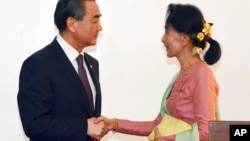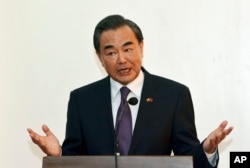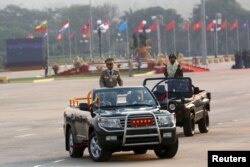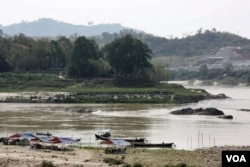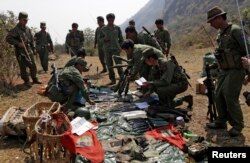The friendly handshake between Myanmar's Aung San Suu Kyi and visiting Chinese Foreign Minister Wang Yi this week is being portrayed in China as a “good beginning” for Sino-Myanmar ties.
But the neighbors’ long-term relationship will hinge on how Myanmar's new civilian government addresses China's concerns about border security and business disagreements.
Considering Myanmar’s economic dependence on China, analysts say it will be difficult for Aung San Suu Kyi and the new government to contain their superpower neighbor’s growing influence over the domestic economy.
Yet China will have to make compromises to resolve its business spats with Myanmar, they add.
Friendly talks
During his two-day official visit, China’s Wang extended an olive branch to Myanmar.
"I've come to send out a very clear signal to the international community that China is pleased to stand by Myanmar and continue to be a good neighbor, a good friend and a good partner, now that Myanmar has turned over a new page in its annals," Wang told Aung San Suu Kyi in Naypyitaw, Myanmar's capital, on Tuesday.
The Chinese official's visit ensured that the close ties Beijing enjoyed with Myanmar's former military-run government will continue now that Aung San Suu Kyi and the National League for Democracy are now in power.
Wang also expressed confidence that consultations can resolve outstanding business disagreements between the two countries, and he said China would guide its enterprises toward a more socially responsible role in Myanmar.
Ending his visit on a positive note Wednesday, Wang assured Myanmar’s Armed Forces commander-in-chief, Min Aung Hlaing, that China is committed to working with Myanmar in safeguarding peace and stability along their shared border.
Regional tensions
On China’s policy agenda are the long-simmering tensions between the central government in Myanmar and ethnic militias in the northern border region near Yunnan province, which have a direct impact on China’s security and bilateral relations with Myanmar. The two countries also have disagreed over controversial Chinese investments in Myanmar, including - but not limited to - the $3.6 billion Myitsone mega-dam project, which Myanmar unilaterally suspended in 2011.
China counts on the new civilian government to resolve both issues soon.
By receiving Wang as her government's first foreign visitor, Aung San Suu Kyi cleared doubts about the trajectory of Myanmar’s future ties with China. However, she failed to commit to a quick solution to the Myitsone dam controversy.
“We want to cooperate peacefully with the world. We will cooperate for peace and human development," she said during a joint news conference with Wang.
Non-alignment
That suggests that the new leader is seeking to keep a neutral stance in Myanmar's bilateral relations with China and other western allies, most notably with the United States, said Jonathan Chow, assistant professor of international relations at the University of Macau.
“What I think we are actually seeing is Myanmar returning to its traditional posture of non-alignment, and I think in that sense we can see continuity with its joining the Association of Southeast Asian Nations in 1997,” Chow said.
He disagrees with the view that since its reforms began in 2011 Myanmar has moved to reduce its dependence on China, in order to align with the United States against China as part of the Americans' encirclement strategy.
Myanmar is diversifying its diplomatic options, but China will remain vital to the fate of the emerging state, Chow added. “Myanmar needs Chinese investment and trade. China desires access to Myanmar for its natural resources and access to the Indian Ocean,” he said, as an alternative route for China to import Middle Eastern oil.
But in return, China also needs to address Myanmar’s concerns by encouraging its companies to ensure a positive social impact there. A number of China’s large-scale resource-extraction and infrastructure projects, such the Shwe gas project, are seen to have harmed the environment in Myanmar and affected public health and the people’s income.
Cease-fire agreements
In addition, Aung San Suu Kyi needs China to mediate cease-fire agreements among several of largest militias active in Myanmar, including the Chinese-speaking United Wa State Army and the Kokang-led Myanmar National Democratic Alliance Army, which do business with Yunnan in the renminbi currency.
“The Wa State is currently the biggest ethnic minority militia in Myanmar, which has closer ties to China [than to the rest of Myanmar] – a fact that Aung San Suu Kyi simply can’t overlook,” said Chao Chung-chi, an assistant professor of Southeast Asian studies at National Chi Nan University in central Taiwan. “So even if the West wishes to use her to contain Chinese influence, she will have to think twice,” he added.
China’s economic importance in Myanmar may eventually outweigh that of the West. But Myanmar will still look to the West to promote democracy at home, said Liang Jinyun, a professor of political science at Yunnan Police College.
“The West plays a bigger role in facilitating [Myanmar’s] democratization while China is key [to foster its] economic benefits and proximity [advantages],” he said.




